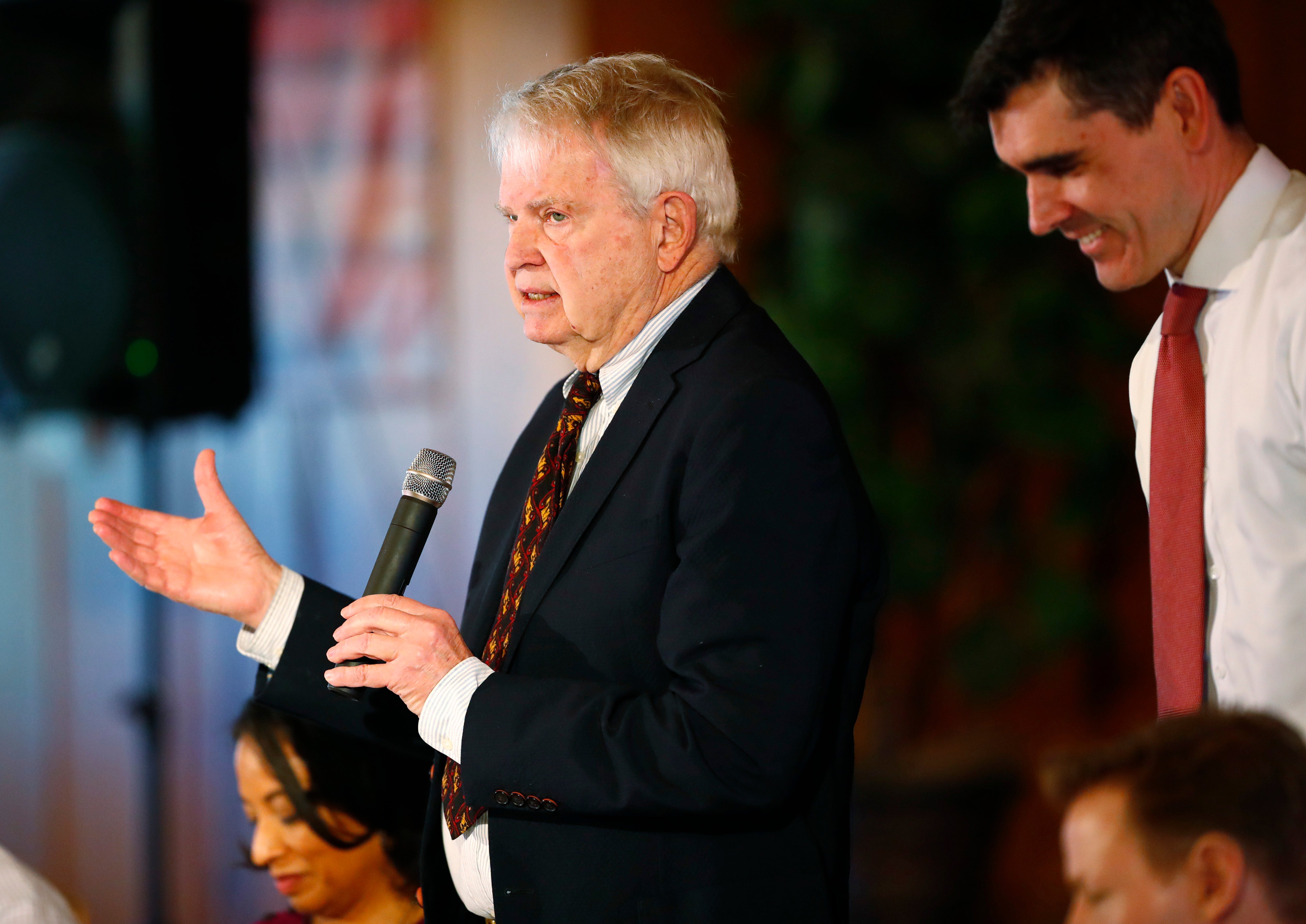Former Colorado Gov. Richard Lamm dies at 85
Former Colorado Gov. Richard “Dick” Lamm, who successfully fought to stop the 1976 Winter Olympics from being held in Colorado even though they had been awarded to the state, has died

Your support helps us to tell the story
From reproductive rights to climate change to Big Tech, The Independent is on the ground when the story is developing. Whether it's investigating the financials of Elon Musk's pro-Trump PAC or producing our latest documentary, 'The A Word', which shines a light on the American women fighting for reproductive rights, we know how important it is to parse out the facts from the messaging.
At such a critical moment in US history, we need reporters on the ground. Your donation allows us to keep sending journalists to speak to both sides of the story.
The Independent is trusted by Americans across the entire political spectrum. And unlike many other quality news outlets, we choose not to lock Americans out of our reporting and analysis with paywalls. We believe quality journalism should be available to everyone, paid for by those who can afford it.
Your support makes all the difference.Former Colorado Democratic Gov. Richard “Dick” Lamm, who successfully fought to stop the 1976 Winter Olympics from being held in Colorado even though they had been awarded to the state, has died. He was 85.
Lamm passed away late Thursday following complications from a pulmonary embolism suffered this week, his wife, Dottie Lamm, said in a statement issued Friday.
Lamm served three terms as governor from 1975 to 1987. As a state lawmaker and environmental activist, he campaigned against having Denver host the 1976 games, arguing it would damage the environment and cost the state. Colorado voters rejected spending state funds on the Games, and they were relocated to Innsbruck Austria
Denver voters later passed an initiative requiring voter approval for any future Olympic Games.
Lamm once said he was treated as a “pariah” by the business community over the affair, but he feared the Games would be economically and environmentally devastating.
Lamm's legacy includes a landmark abortion rights law and state ratification of the Equal Rights Amendment in 1972. The proposed amendment eventually fell several states short of ratification. He also appointed the first woman to the state's Supreme Court.
“Gov. Lamm took on tough issues, and he never shied away from civil political discourse and embraced collaboration,” Democratic Gov. Jared Polis said in a condolence message Friday. "Gov. Lamm’s legacy and leadership will be remembered in our state’s history as well as his work to make Colorado an even more amazing place.”
Lamm was born on Aug. 3, 1935, in Madison, Wisconsin. He received a bachelor’s degree from the University of Wisconsin and a law degree from University of California, Berkeley. He also served in the U.S. Army. In 1962 he became an attorney for the Colorado Anti-Discrimination Commission, and from 1965-1974 had his own law practice.
He and his wife, Dottie, married in 1963. Dottie Lamm is a women's rights activist and a former Denver Post columnist.
Dick Lamm served as a state representative from 1966 to 1974 before becoming governor. He was elected to three terms, before Colorado restricted governors to two terms in office.
He ran unsuccessfully for a U.S. Senate nomination to replace Sen. Tim Wirth. In 1996, he sought the presidential nomination for the Reform Party, losing to Ross Perot of Texas.
Lamm swept into Colorado politics as a John F. Kennedy idealist but years later came to be nicknamed “Governor Gloom,” a realist focused on the nation’s future.
As a legislator, he pushed through one of the first pre-Roe vs. Wade abortion laws. It became a national model.
“I decided that would probably be the end of my career, but it just seemed to me outrageous that you would force unwilling women to have unwanted children,” Lamm told The Associated Press in a 1996 interview. “I just can’t not fight for what I believe in.”
Lamm spent much of his last term as governor writing and speaking on the fiscal irresponsibility of his generation and what he called the need to rein in immigration and curtail entitlement programs such as Social Security. He opposed the death penalty as governor but endorsed it after leaving office.
“Over the 12 years he was governor, he became more conservative, and I think the reason he became more conservative was because he learned the realities of governing and the realities of financially managing a government,” Nancy Dick, Lamm’s lieutenant governor during his last two terms, recalled at the time.
Lamm initially had the benefit of a Democratic House to help him pass legislation focusing on land use, equal rights, mining severance taxes and growth management. But a Republican wave overtook the Legislature two years into his administration. From then on Lamm battled two hostile chambers.
The Legislature reined in the power of the executive branch after deciding Lamm had gone too far with growth management policies.
After leaving politics, Lamm served as executive director of the University of Denver’s Center for Public Policy and Contemporary Issues and co-authored several books. He was an outdoor enthusiast and enjoyed hiking, mountain climbing and skiing.
He and his wife had two children, Scott Hunter Lamm and Heather Susan Lamm.
Funeral services were pending, his wife said.